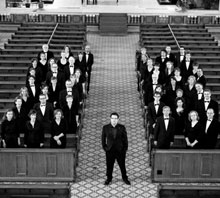Flash version here.
 This season marks the 40th anniversary of Montreal’s St. Lawrence Choir. The 70+ voice amateur choir will celebrate with a concert accompanied by the Longueil Symphony and featuring the Montreal premiere of musicologist Robert Levin’s reworking of Mozart’s great Mass in C Minor. The young conductor Michael Zaugg will be on the podium.
This season marks the 40th anniversary of Montreal’s St. Lawrence Choir. The 70+ voice amateur choir will celebrate with a concert accompanied by the Longueil Symphony and featuring the Montreal premiere of musicologist Robert Levin’s reworking of Mozart’s great Mass in C Minor. The young conductor Michael Zaugg will be on the podium.
The St. Lawrence Choir was formed in 1972 by Iwan Edwards and a group of singers from Montreal’s West Island. Since then, the Choir has regularly appeared with the Montreal Symphony Orchestra and has made numerous recordings. In 2008 the St. Lawrence Choir came under the direction of the Swiss-born Zaugg. In a few short years, Zaugg has established himself as an innovative, versatile and in-demand conductor on the Canadian choral scene.
Zaugg met former St. Lawrence choir director Iwan Edwards in 2005. “He actually told me about the job in Ottawa [with the Cantata Singers], which is one of my other groups, and which became my first job in Canada,” Zaugg says. “So he was kind of crucial in getting me into the choral scene here in Canada.” In 2008, Edwards resigned his position with the St. Lawrence Choir. After a short search, Zaugg was invited to be the director.
The St. Lawrence choir had firmly established itself as a large oratorio choir under Welsh conductor Edwards’ baton. Zaugg continued to uphold this tradition, while also bringing in his own European flair. “There is a very specific repertoire that we have to do.” Zaugg says. “We do bigger works, and that’s part of what I want to keep in the profile.”
The St. Lawrence Choir’s upcoming concert celebrates this tradition with a performance of Robert Levin’s reworking of Mozart’s Mass in C Minor. The Mass in C, like Mozart’s Requiem, was left unfinished at his death. “Maybe 60 or 70 percent [of the Mass] was completed, and then there were just some notes and ideas left,” Zaugg says. “What Levin did is just to, at specific parts, add a little bit more flesh to Mozart’s notes.”
Levin, a musicologist, took Mozart’s ideas, and put them in the structure, borrowing from another similar piece that Mozart wrote, Davide Penitente. Borrowing was a common practice during Mozart’s own time.
This reworked version offers a fresh look at a well known masterwork. “It’s kind of looking backwards with the standard repertoire,” Zaugg says, while also “looking forwards with what is new about the piece. That’s maybe a profile that we can then transfer to the choir itself. We’re based in the tradition, but we have to be innovative and try and change. And look at classical music from different sides.”
Similarly, their next season promises a mix of tradition as well as a looking forward to the future of classical music.
“We have works by Bruckner, by Brahms, by Scarlatti, by Saint-Saëns; so we have the main composers represented,” Zaugg says. “But at the same time, I like to put them in a context with more contemporary composers. So there will be music by Whitacre, and Mealor, [who] wrote the Ubi Caritas for the Wedding of Kate and William… So there’s a dialogue between old and new; there’s a dialogue within the music itself.”
Zaugg is known for his use of multidisciplary arts, as demonstrated in last season’s concert which involved 10 artists in the concert hall creating new paintings in real time to the music. He also advocates the use of social media, the internet and new technology in the rehearsal room and as a teaching tool.
“I’m in a research project with a university in Norway, and we’re trying to see how we can use Skype or the internet to do conducting from [Canada] to Europe; and how would that work? I’m currently doing auditions for a youth choir over Skype. There are a lot of possibilities opening up. And I think in classical music, we are still behind.”
Zaugg is even interested in the impact of social media in the concert hall. He talks of Tweets during concerts, and even special “Social Media Sections” in the concert hall that would allow concert goers to Tweet their comments live, with the possibility of having those Tweets streaming during the concert itself.
“How are our classical concerts going to take place in 20 years, in 30 years, in 40 years, in 100 years? There will still be classical concerts, but will there still be concert halls? Will everything be online? Will everything be streamed? So, I find it interesting at this point to try things out,” he says.
Though the St. Lawrence Choir hasn’t quite reached the point of Tweeting during their concerts, they have post rehearsal and performance clips on their YouTube channel and Tweet during rehearsals.
“Things will change,” Zaugg says. “And I think we have to be at a point where we can be part of the change, or at least anticipate it to the extent that when it’s happening, we’re not just standing there like ‘Oh, what now? How should we adapt to that?’ Let’s be there, know what can happen so we adapt while it’s happening.”
May 26 at 7:30 p.m. Église St-Jean Baptiste, Montreal. With the Orchestre Symphonique de Longueuil. www.choeur.qc.ca
On twitter: @ChoeurStLaurent
Version française...

